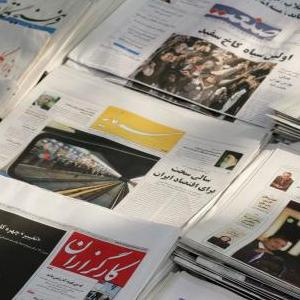Tehran's Daily Newspaper Review

Despite all its bashing of international organizations and global capitalism, Iran proudly presented the IMF’s report of Iran's booming economy on its front page. “Iran, the seventeenth largest economy of the world,” the newspaper’s top headline read. The wave of cold weather covering Iran and the consequent all time high gas consumption was the other top headline of the newspaper. “We persist in the path of velayat-e faqih,” the newspaper quoted Mahmoud Ahmadinejad, also quoting the president’s legal advisor Mirtajeddini that “the government welcomes accountability,” while the parliament is preparing to summon Ahmadinejad.
“Obama backs off; war against Iran not on the table,” Kayhan published as its top headline. Aggravating confrontation between Egyptian citizens and the military following the tragic death of tens of Egyptian football fans in Port Said, the sit-in in Bahrain in protest to Al Khalifa’s crackdown, and the inauguration of a state-of-the-art biotechnological medicine production line were other headlines appearing on the front page. Kayhan also published the primary slate of the United Principlist Front for Tehran constituency in the upcoming parliamentary elections, which will be held in less than a month. Absent from the list are Ali Motahhari, outspoken critic of Ahmadinejad, Hamid-Reza Katouzian, supporter of Mir-Hossein Mousavi in the 2009 presidential election, and Ali-Reza Abbaspour, critic of the government and an advocate of Abdullah Jasbi, ex-president of Islamic Azad University.
Resalat’s top headline was also related to the United Principlist Front’s list of candidates in Tehran. The newspaper added an element of ideological statistics to the news, reporting that from the 28 nominees, seven come from families who have sacrificed martyrs for the Islamic Republic, nine have been wounded in action, nineteen have fought in the war front, four are economists and two are nuclear experts. “The 22nd of Bahman [anniversary of the victory of the Islamic Revolution] rally will thwart the US’ plots,” the newspaper quoted Ayatollah Mahdavi Kani, spiritual leader of the Principlists. The newspaper’s editorial, penned by Mahmoud Farshidi, a candidate of the Principlists for Tehran constituency, called for Iranians’ massive turnout in the parliamentary elections to reinforce the Islamic Republic against foreign plots.
Shargh’s top headline was also Obama's remarks on the military option against Iran's nuclear program. The newspaper also covered a Hamas-Fatah deal to end several years of dual governance in the Palestinian territories. Hashemi Rafsanjani’s office’s denial of claims by Farhad Daneshjou, would-be-president of the Islamic Azad University, that the ayatollah –as the head of the university’s board of trustees- refuses to approve his chairmanship was also covered by the newspaper. The newspaper’s editorial by Mohammad-Ali Sobhani, Iran's former ambassador to Lebanon and Jordan, reviewed the agreement between Hams and Fatah to form a united government.
Tehran-e Emrooz’s top headline reported of the US Senate’s permission for the sale of ancient Iranian artifacts kept by the University of Chicago as compensation for victims of terrorist attacks allegedly supported by Iran. “Agreement with the Resistance Front is unlikely,” the newspaper quoted Ayatollah Mahdavi Kani, the final word after weeks of dispute between the mainstream United Principlist Front and the Resistance Front –Ahmadinejad's supporters following an agenda of marginalizing Mashaei. The newspaper’s editorial welcomed unity between the Principlists, presupposing that Mahmoud Ahmadinejad's camp does not belong to the front anymore.
* Notes:
The editorial section of Iranian newspapers is not the work of the editor-in-chief or the senior editorial staff of the newspaper by default, but can be a contribution by experts and politicians (typically agreeing with the newspaper’s political stance.) The newspapers may also occasionally publish without an editorial.
Vatan-e Emrooz daily does not publish on Thursdays.
Trouble with understanding some terms? Check our Glossary of Iranian Political Terms.
Briefing
Iran is the official organ of the administration. Its current editor-in-chief is Ali-Akbar Javanfekr, former media advisor to President Mahmoud Ahmadinejad.
Jomhouri-ye Eslami (The Islamic Republic) was known as the official organ of the Party of the Islamic Republic, founded in 1979 and disbanded in 1987. Currently, it is an open critic of Mahmoud Ahmadinejad's policies and is known to be a mouthpiece of Akbar Hashemi Rafsanjani.
Kayhan (Universe) is a hard-line conservative newspaper. Its editor-in-chief –currently Hossein Shari’atmadari- is directly appointed by Iran's Supreme Leader. Shari’atmadari’s editorials often spark off controversy and debate inside Iranian political circles.
Resalat (Mission) belongs to the moderate wing of the Principlist camp. Resalat’s best known analyst is Amir Mohebbian, its political editor.
Shargh (East) is a moderate Reformist newspaper. It was the most popular and influential Reformist newspaper in its first period of publication which lasted from August 2003 until September 2006.
Tehran-e Emrooz (Tehran Today) is a “Principlist/Reformist” newspaper, connected to Mohammad Baqer Qalibaf, Tehran Mayor and a likely candidate of the 2013 presidential election.
Vatan-e Emrooz (Motherland Today) is a supporter of the president’s policies.

